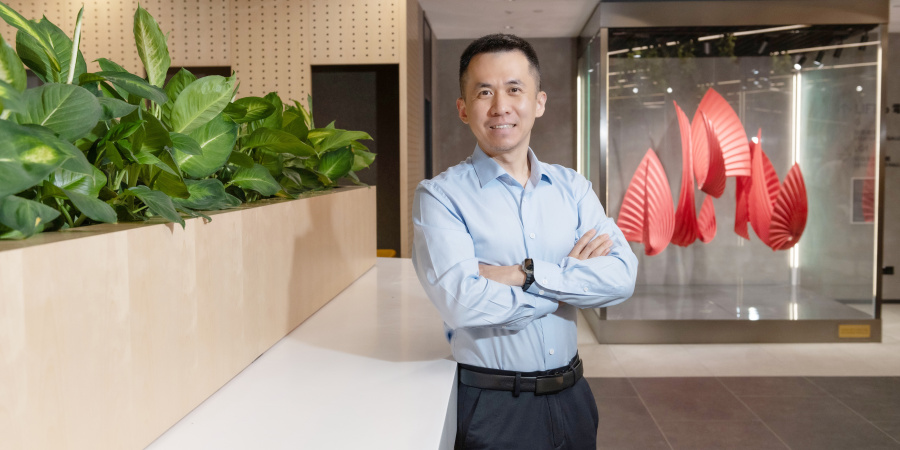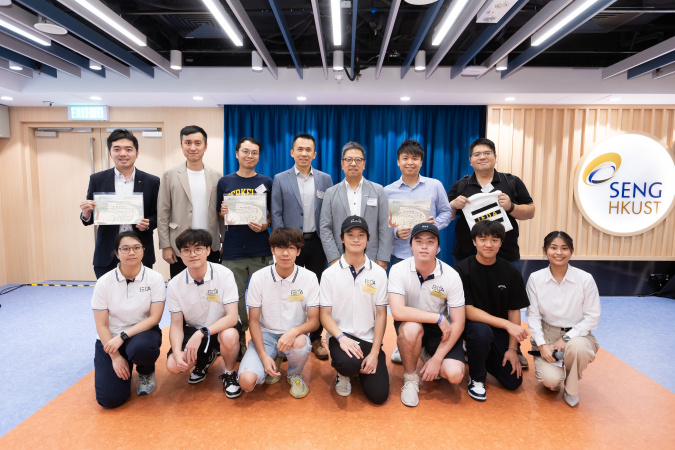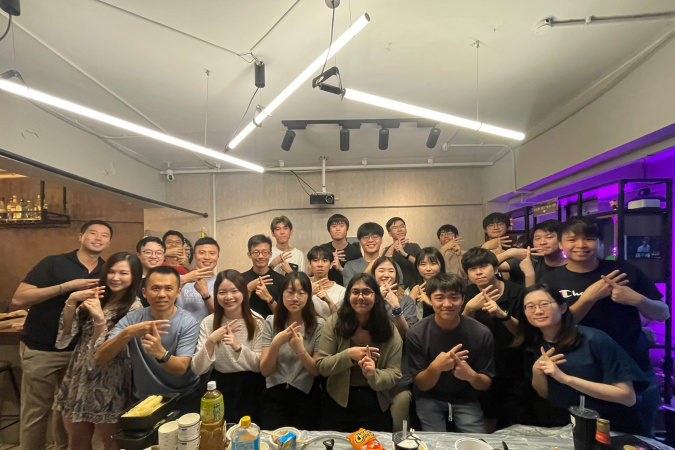Prof. ZHANG Jiheng Commits to Development of Hong Kong’s Smart Hub
Prof. ZHANG Jiheng, born in Nanjing in the late 1970s, immersed himself in the captivating world of mathematics before transitioning to engineering at age 23 as a PhD candidate at Georgia Tech. After working for 12 years at HKUST, he embraced the challenge of leading the Department of Industrial Engineering and Decision Analytics (IEDA) as its Head, a role he had not foreseen but has grown to cherish. More recently, he has taken on the ambitious endeavor of contributing to Hong Kong’s vision as a smart hub through innovative Theme-Based Research.
“Taking this administrative role as Head of the Department has been a significant challenge, requiring huge time, effort, and substantial adjustments,” said Prof. ZHANG Jiheng, who once envisioned a career centered solely on teaching and research. “The trust of my colleagues opened this leadership opportunity for me. The experience has been enriching, offering deep insights into the university’s operations and the perspectives of top management and the challenges we are facing. This invaluable personal growth equips me to pursue greater endeavors with my research team in the future.”
Growing up with abundant books
Prof. Zhang had demonstrated earlier in life the ability to focus on his pursuit while embracing change. Benefiting from China’s reform and the revamped education system along with other members of the post-80s generation, he took part in Mathematics and Physics Olympiads as an adolescent. This led to his entry into one of Nanjing’s elitist high schools that had nurtured members of the Chinese Academy of Sciences and the Chinese Academy of Engineering. He was grateful that the school encouraged extensive reading and emphasized the arts and humanities on top of the core subjects for university entrance examination.
Since a young age, he benefited from books on popular science for adults much older than himself. In fact when he was born, his father was a Mathematics student who was among the first cohort of students to enter the university after the Cultural Revolution. Upon graduation, his father worked at the education department from which books could be borrowed. The young Zhang discovered the wonders of science through books exploring how elements in the sun are identified by analyzing sunlight and other natural phenomena. When he went to university and read the textbooks and notes kept by his father, he realized that his father could have been a really good scholar.
Raised during China’s rise, the young and talented Zhang pursued opportunities offered by the times by working hard and staying focused. When he graduated as one of the top Mathematics students at Nanjing University, he went on to pursue further study in Mathematics at Ohio State University in the US with scholarship.
Shift in academic interest
There came a major turning point in life. “As I grew older, I became more attracted to practical subjects that make real impact.” This was not about job prospects, but a sheer shift in academic interest and passion. “Whereas the world of mathematics is clean, perfect and well-defined, the real world is random and imperfect. To solve real-life problems, we need to have an open mind and be tolerant of imperfect models which are nevertheless useful and sensible enough.”
Quoting statistician George BOX who said “Every model is wrong, but some are useful”, Prof. Zhang pointed out that scholars who make the transition from theories to practice need to bear this in mind. Today, while remaining interested in mathematical models, he finds it even more fulfilling to apply them.
After spending one year at Ohio State University, where he earned an MSc in Mathematics, Prof. ZHANG Jiheng switched to an engineering major at the Georgia Institute of Technology, one of the top engineering schools in the world. Upon completing his MSc in Industrial Engineering and PhD in Operations Research, he received an Honorable Mention in the George Nicholson Student Paper Prize from INFORMS in 2009. In addition to these academic achievements, he built lasting friendships with peers from around the world, later reflecting: “Learning a lot and making friends from all over the world, I had a wonderful experience in the US.”
His next destination was Hong Kong. “Asia was quickly developing and the Hong Kong government was committed to tertiary education, as demonstrated by the founding of HKUST.” When he came to HKUST for an interview in 2009, a friend who was pursuing PhD at HKUST at that time took him around to see the swimming pool and the gym. “Wow, what a fantastic university!” He recalled with excitement.
He belonged to the generation on the Mainland that grew up watching Hong Kong movies. “In movies, you see Kowloon City and Central,” he uttered these names with perfect Cantonese pronunciation. “And now, these places in fairy tales are right in front of you!”
He marvels at Hong Kong’s unique blend of urban and rural landscapes, where he can run marathons and tackle 100km trail runs, with city and countryside just a half-hour jog apart. On HKUST’s picturesque campus, he regularly plays tennis and visits the gym to maintain a healthy work-life blend.
Contributing to Hong Kong’s smart hub through Theme-Based Research
Prof. Zhang continues to be deeply impressed by HKUST’s superb teaching and research platform, as well as Hong Kong’s research environment. “The Hong Kong government provides a wide range of generous funding opportunities through programs like the Research Grants Council (RGC) and the Innovation and Technology Fund (ITF), which are notably more substantial compared to funding in the US.”
His research spans across service operations management, queuing systems, applied probability and others. Recently, he has extended his pursuit to energy management, building a mathematical model to optimize energy transfer to achieve efficient charging of electronic vehicles. He is most proud of the advancement in framework to prove properties of stochastic network, so as to improve utilization of power grid.
With the heart to serve Hong Kong, he is currently leading a major research project that can shape Hong Kong’s supply chain, one of Hong Kong’s major economic pillars. “Hong Kong’s global supply chain in the 60s and 70s had contributed tremendously to the city’s success. Having said that, there is now aging mindset and infrastructure. The shortage of land means that we can hardly have the largest port. Yet how about becoming the most efficient and the smartest hub? That is the next growth opportunity for Hong Kong, and it motivates me.”
The five-year project on Enhancing Hong Kong’s Role in Sustainable Supply Chain Finance via Technology Transformation, led by Prof. Zhang, was awarded a grant of over HK$ 61 million by the Research Grants Council’s Theme-Based Research Scheme last year. With experts in data analytics, operations research and finance, the team has the ultimate goal to develop open-source software tools with AI components to enable smart supply chains that strike a balance between efficiency and sustainability. It can be used by all players along the supply chain, including SMEs, manufacturers, warehouses, retailers and others.
“I have benefitted a lot from Hong Kong and I want to give back to the city. Scholars can also contribute to economic growth.”
Inspiring the next generation of researchers
What are his visions for the IEDA Department? As the Undergraduate Programs Coordinator previously, he had helped revamp the curriculum by integrating advanced subjects. Now as the Department Head, he aspires to facilitate top-tier research and place postgraduates at the world’s top universities. For undergraduates, he believes in helping students build solid foundations and acquire portable skills via career sessions, internships, as well as the minor program in Financial Engineering offered by the Department. Graduates are well-prepared for promising careers in sectors that leverage mathematical models and data for strategic decision-making, including academia, high-tech, finance, risk management, supply chain, and healthcare.
For young people, Prof. ZHANG Jiheng offers this advice: “High school students should immerse themselves in wide-ranging reading to explore the world and discover their passions. Undergraduates should set clear goals, remain proactive, and maintain a positive outlook.”
“As an educator and researcher in Hong Kong, I am deeply committed to contributing to the community and giving back to this vibrant city. There is a lot that we as educators can do for Hong Kong, such as making continuous progress to the University’s superb education platform to help students meet global challenges and achieve success amidst global competitions. Also, I long to apply my expertise in the local environment so as to spearhead the city’s AI hub and internationally renowned global supply chain.”
From the perfect world of pure mathematics to the practical need to solve real-life problems, from scholar to administrator, from Mainland China to the US and now Hong Kong, Prof. Zhang has demonstrated the need to have both global visions and local undertakings to learn from and to give back fully to the community.




